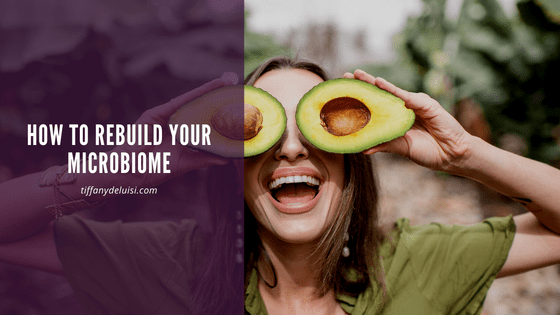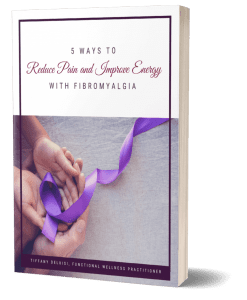How to Rebuild Your Microbiome

Did you know your gut could have up to 500 species of bacteria which weighs about 3 pounds!
This bacteria is often called the microbiome and to be more specific the entire set of microorganisms in your microbiota — bacteria, fungi and viruses. They have a unique place and function inside your body. Bacteria make-up the majority of the cells, about 30-50 trillion.
Your individual microbiome is as unique as your body shape and size. Geography, gender, age, what you’re exposed to, diet, health, and basically everything that you are, experience and come in contact with. Hence, the microbes are always in flux.
Is your microbiome RICH and DIVERSE?
Most of the microbes are present in the large intestine and vary throughout the intestines. Common species found within the gut are Bifidobacterium, Lactobacillus, Bacteroides, Clostridium, Escherichia, Streptococcus, and Ruminococcus.
When looking at WHO lives in your microbiome we use both the terms richness and diversity to describe them.
Richness = the number of total bacterial species
Diversity = the number of each type of bacterial species
The way I like to think about it is this way:
Think of a large group of people in a room. If we were to organize them by occupation, RICHNESS would indicate the total number of different occupations present. (Teachers, nurses, mechanics, etc)
DIVERSITY would be how many people of each occupation there were. (32 teachers, 96 nurses, 48 mechanics, etc)
Just as in a community, when both the richness and diversity is high, it is much stronger and more resilient. If there’s a lot of people with different specialties, there’s the perfect person for each job.
Different species of bacteria play different roles within the gut.
Are you a part of this group?
When a patient comes to see me for the first time, I always use an in depth questionnaire + a long introductory appointment to really get to know them.
During this process of analyzing your whole life history and how it relates to your health, I’m looking out for specific clues that your microbiome might be imbalanced…before we even begin testing!
The microbiome is quite delicate and many different things can disrupt its balance.
For example, did you know that just one round of antibiotics can decrease diversity by 30%?
Clues that I’m looking for that might indicate that you’re in a high risk group for a microbiome imbalance:
- Born via c-section rather than vaginally
- Multiple rounds of antibiotics throughout your life
- A low fiber diet
- Predominantly a SAD diet
- Any chronic or autoimmune disease
- Sedentary lifestyle
- Long term low carb / keto diet
- Stressful lifestyle
- Certain prescription medications
- Your age
- Travel history (did you go somewhere known for travelers’ gut?)
- Past illnesses
- A diet full of sugar
- Constipation
- Exposure to environmental toxins
- Tap water that’s full of chemicals
- Use of conventional skincare products
- Use of toxic cleaning supplies
- Living in a city vs living in a rural area
- Eating the same thing every day
- Not eating enough quality or quantity of vegetables
- + more
I’m always looking to piece together your unique history and what it might mean for the symptoms that you are currently experiencing.
So now what? If you suspect an imbalanced microbiome, here are my top tips to begin rebuilding your microbiome!
My top tips to rebuild diversity of the microbiome:
Focus on high quality sleep.
Disrupted and not enough sleep not only promotes stress and low mood but also obesity. Research shows that sleep deprivation accelerates weight gain because it significantly changes your gut flora.
Consistent Exercise
Working out regularly helps create more bacterial diversity in the gut. Therefore, focus on increasing your good bacteria by keeping yourself physically active.
Destress
Find time for yourself to unwind from all the hustle and bustle of the metropolitan cities. Your mind and gut affect each other equally.
Avoid these foods
Avoid sugar, artificial sweeteners, processed foods, and dairy as they can disrupt the balance of the gut flora.
Eat these foods
Increase the intake of nuts, herbs, greens, berries, wild foods, and whole grains if you’re lacking in them. These foods are full of fiber to support your microbiome.
Take probiotics
Take high-quality probiotics everyday to boost a healthy ecosystem of your gut flora.
Eat at home
Prepare your own meals that focus on whole foods that aren’t overly processed. Processed foods can impact the balance of good bacteria to bad bacteria.
Include fermented foods
Include lots of green veggies and fermented foods in your diet like pickles, kimchi, kefir, yogurt, miso, Kombucha etc. Veggies = food for the natural probiotics found in fermented food.
Drink filtered water
Most tap water (yes, even “clean” tap water found in the US and Canada) can have many toxic chemicals in it. Even the chlorine found in the tap water can disrupt the microbiome.
Eat the rainbow
I love the motto: “Eat the rainbow” when it comes to eating your veggies & fruit. They are chock full of phytonutrients like polyphenols, vitamins, minerals (and fiber!) that support the microbiome’s development. Each different color has different benefits.
Consume enough fiber daily
Fiber contributes to a healthy microbiome by increasing diversity and helps produce short-chain fatty acids. In addition, fiber keeps things flowing throughout your digestive tract so that things don’t become stagnant which can lead to an overgrowth of bacteria that you don’t want!
Eat prebiotic foods
Prebiotics = food for good bacteria! It’s important to always keep feeding the good guys! The bad guys thrive off of sugar and other common foods found on the SAD diet. Common prebiotic foods include chicory root, dandelion greens, Jerusalem artichoke, garlic, onions, leeks, asparagus, and (green) bananas.
Challenge time!
Are you up for a 3 day challenge?
YES?
Research shows that only 3 days of clean eating can dramatically impact the microbiome!
Here are the rules of the game:
3 days of eating high quality:
- Veggies
- Fruits
- Proteins
3 days of avoiding
- Sugar
- Gluten
- Dairy
- Packaged foods
- Alcohol
Want personalized support to heal your microbiome? Sign up for a free discovery call to learn more about my process. https://p.bttr.to/3yGXLrA







